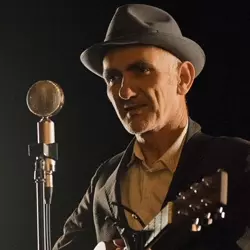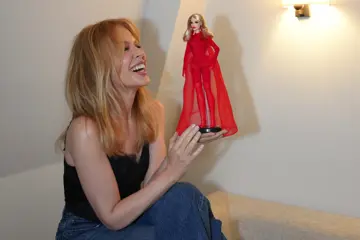 Paul Kelly
Paul KellyStrong storyline, relatable characters, poignant message. The current buzz around the screen adaption of Paul Kelly’s 1996 classic, How To Make Gravy, about Joe penning a letter from prison four days before Christmas, shows how it captured the lightning in the gravy bottle.
Similarly, First Nations rapper Jacob Harvey’s song Streetlights—remembering his Alice Springs childhood when the family slept under a street light in a park to be safe—inspired Danielle Loy to make her directorial debut. Under Streetlights, a film about the rough streets of Alice Springs, is heading for cinema this month, with Harvey playing the role of a rapper in a fractured family.
Here are 15 examples where filmmakers caught the groove just right or misfired badly.
The Indian Runner (1991)
Song: Highway Patrolman, Bruce Springsteen
In this song from Nebraska, Joe became a cop in 1965 after his wheat farm failed. Three years later, his brother Frankie was released from the army, presumably after a stint in Vietnam.
One night, Joe responded to a call from a bar where a man was badly beaten. Eyewitnesses ID’d Frankie. The cop chased his bro’ through rural Michigan right to the Canada border. He clearly let him escape. The song went: "When it's your brother, sometimes you look the other way" and "I pulled over the side of the highway and watched his tail lights disappear."
Sean Penn, who was dating Springsteen’s sister, loved the song and earned brownie points by promising to make a movie of it.
Don't miss a beat with our FREE daily newsletter
In 1991, he wrote and directed The Indian Runner, starring David Morse and Viggo Mortensen. It dug deeper into the brothers’ relationship and expanded on how Frankie kept breaking the laws his brother had promised to uphold.
It ended with the song’s bar beating and chase to the border. The Indian Runner title was derived from a local myth: Native Americans roamed farmlands carrying messages and escaped from wolves and bears because of their speed.
Feeling Minnesota (1996)
Song: Outshined, Soundgarden
Outshined was one of Soundgarden singer Chris Cornell’s most personal songs, dealing with the rapid extremes of his moods. When he was feeling low, he saw himself in a mirror, in baggy shorts and a T-shirt, exuding a laid-back, happy surfer. "I am looking California but feeling Minnesota."
The song was the highlight of his solo shows. The line also became a pop culture phrase.
First-time director Steven Baigelman used it for a movie in which Keanu Reeves and Cameron Diaz, facing roadblocks in their lives, turn to violent crime and Mafia connections to survive.
Jolene (2008)
Song: Jolene, Dolly Parton
Dolly Parton’s song was inspired by two real Jolenes, both redheads. One was a 10-year-old autograph seeker whom she considered “the prettiest little thing I ever saw.”
The other was a bank clerk flirting with her new husband, Carl Dean. The singer chuckled to the audience at Glastonbury in 2014, “I put a stop to that. I got rid of that redhead woman in a hurry.”
In the movie by director Dan Ireland, Jolene is a troubled orphan who seduces her husband’s uncle, is put in a juvenile mental institution, and earns a living as a tattoo artist, prostitute, erotic dancer and Mafia “moll”.
Maximum Overdrive (1986)
Song: Who Made Who, AC/DC
After horror movie writer Stephen King had his books turned into successful movies, he decided in the mid-80s to direct one himself. He chose his 1973 short story Trucks, published in Cavalier magazine, about a small town truck stop where the trucks came alive via a mysterious force and went on rampaging, killing humans.
As King worked on the script, he marked each scene with which songs would work best. Most turned out to be by AC/DC (his second favourite band after Creedence), and he asked them to write new songs for it.
Already recording in the Bahamas, the Seedies chucked him three – Who Made Who, D.T. and Chase The Ace. He chose Who Made Who.
In the end, Maximum Overdrive was a dud. King hated it and considered the music the only decent thing about it. It was no consolation to AC/DC: Who Made Who was a hit for them, but they never liked it.
Across the Universe (2007)
Song: Across The Universe, The Beatles
John Lennon and his first wife, Cynthia, had an argument while in bed, and she kept nagging.
Brooding about her words “flowing like an endless stream’, Lennon explained, “I went downstairs, and it turned into sort of a cosmic song rather than an irritated song.” The refrain "Jai Guru Deva Om" is a mantra to lull the mind into higher consciousness.
When Julie Taymor made a movie about hope and revolution in the ‘60s, she was drawn to similar themes in Fab Four songs. She incorporated Beatles characters such as Jude from Hey Jude, Lucy from Lucy In The Sky With Diamonds, and Max from Maxwell’s Silver Hammer.
The Gambler (1980)
Song: The Gambler, Kenny Rogers
Hit writer Don Schlitz wrote the song in 1976 about the narrator riding aimlessly on a train when he came across the gambler. The latter sized up that the narrator needed advice and offered him pointers in life in exchange for a bottle of whisky and a cigarette.
Schlitz had no idea how the lyrics, which used poker metaphors, came out of the blue, but he figured it was from his father, who’d died earlier that year.
The made-for-TV adaptation starred Kenny Rogers, who had a hit with the song in 1978, as a singer and gambler looking for his son.
The Hitcher (1986)
Song: Riders On The Storm, The Doors
Doors singer Jim Morrison was partly inspired by cowboy knees-up (Ghost) Riders In The Sky, real-life hitchhiking killer Billy "Cockeyed" Cook, about whom the 1953 film The Hitchhiker was made, and his soulmate Pamela Courson.
Morrison’s super evocative words were mirrored in the Doors’ jazz treatment. It was the last thing he recorded before heading to Europe, where he died in Paris. Doors producer Paul A. Rothchild dissed the song's “cocktail music” and stormed out of the L.A. Woman album sessions.
“I felt it was a great jumping-off point for a thriller," said screenwriter Eric Red. The Hitcher, starring Rutger Hauer, was about murdering hitchhiker John Ryder, who stalked a young motorist across West Texas. He informed the kid he wanted to kill him and challenged him, “Stop me”.
The original script included an eyeball in a hamburger (later a severed finger in fries), a woman tied to a truck and torn in half and a family murdered in their station wagon.
Boyz N The Hood (1991)
Song: Boyz N The Hood, N.W.A
The song saw Ice Cube skilfully writing about gangsta life in Compton, California, and narrated by Eazy-E. The movie was a hood crime drama; it grossed $50 million on a $6 million budget.
Directed and written by John Singleton, who was making his film debut, it starred Cuba Gooding Jr., Ice Cube (who was startling in his film debut), and Laurence Fishburne, who was credited as Larry Fishburne.
After Gooding Jr.’s character Jason "Tre" Styles III was expelled for fighting at school in middle-class Inglewood, his single mother packed him off to live with his father in South Central LA, where he became influenced by its gang culture.
The coming-of-age picture bristled with street cred scenes about the Cripps gang, prison terms, confrontations with cops and gun battles leaving friends dead or paraplegic.
Singleton developed the film as a requirement to get into film school in 1986 and graduated in 1990. He became the first African American to be nominated for a Best Director Grammy.
Ice Cube went on to do more acting work. The line "Rolls down the window, and he starts to say, it's all about making that GTA" inspired the video game series Grand Theft Auto.
Original Sin – The Seven Sins (2021)
Song: Original Sin, INXS
In the 1980s, when the idea of interracial couples was still awkward for parts of America, it was a bold statement by Michael Hutchence to sing of a white boy and black girl who "play with fire" and "dream on, the name of love".
Seeing kids of all colours in playgrounds playing happily, he thought the original sin was for parents to pass their conditioning to kids.
Original Sin was originally titled Brand New Day, but the track’s producer, funkmeister Nile Rodgers, from an interracial family, suggested a title change as “psychologically that makes it a bigger statement." The track was ghosted by some radio stations in the southern states.
US director Amy Tinkham’s brief from INXS manager Chris Murphy, who executive-produced, was to “let INXS music tell you what to do” and create the plot.
Tinkham’s take was a modern-day love story with heroine Jane, shattered after being isolated during the pandemic, experiencing the seven sins of hell from Dante’s 14th-century poem Inferno – pride, envy, wrath, sloth, greed, gluttony and lust – before finding spiritual enlightenment.
Jumpin’ Jack Flash (1986)
Song: Jumpin’ Jack Flash, The Rolling Stones
Mick Jagger described The Rolling Stones’ return in 1968 to their rock roots on Jumpin’ Jack Flash after their psychedelic doodling, as about a man "having a hard time and getting out (as) just a metaphor for getting out of all the acid things.”
His gas-gas-gas lyrics about JJF “born in a crossfire hurricane/ and I howled at my ma in the driving rain” and “I was drowned, I was washed up and left for dead/ I fell down to my feet and I saw they bled” implied an interesting backstory.
But Penny Marshall’s directing debut opted for a New York computer operator (Whoopi Goldberg) getting an online SOS from a Brit secret agent trying to escape from behind the Iron Curtain and pursued by the Russian secret service.
She cracked his encryption password via Jumpin’ Jack Flash and put her life in danger. Even Goldberg’s comic flair couldn’t get over the recurring problems with the script, and the end result was filed under “stodgy”.
Aretha Franklin did the film’s version of Jumpin’ Jack Flash, produced by Keith Richards who also played guitar on it.
Pretty In Pink (1986)
Song: Pretty In Pink, Psychedelic Furs
Pretty In Pink was not a love song about a girl’s fashion style. It was a mean one about a girl who slept around, with the title meaning “naked”. “The one who insists he was the first in the line is the last to remember her name,” went a line.
Psychedelic Furs’ Richard Butler explained of her serial boots-knocking: “It makes her feel empowered somehow and popular, and in fact, the people that she's sleeping with are laughing about her behind her back and talking about her."
The song was not a hit when released in 1981. It was revived in 1986 when actress Molly Ringwald, who was going through an all-pink phase, sent it to director John Hughes to do something with it.
Hughes’ script was based on the song. Butler whinged, “He totally got the whole thing wrong. It was nothing like the spirit of the song at all.”
What we got was high school cliques, love spats, rich brats bullying those from working-class suburbs, and a prom to which the main character arrived dressed in pink. It failed at the box office but has brat pack cult classic status.
Detroit Rock City (1999)
Song: Detroit Rock City, Kiss
The song (from 1976’s Destroyer) and the movie extolled the exhilaration of being a fan of rock music, of bands that pile-drove that obsession, and the anticipation of seeing them live.
Kiss was from New York, but they sang about ‘70s Detroit’s MC5, Grand Funk, Bob Seger, Motown, Alice Cooper, Suzi Quatro, and Ted Nugent. The song hung its hook on a real-life Kiss fan who crashed into a truck and died in his enthusiasm to get to a Kiss show.
The 1999 movie Detroit Rock City, produced by Gene Simmons, was set in the mid-‘70s and was about a group of Kiss fans from Detroit who played in the Kiss tribute band Mystery and did their utmost to get to the show.
But one of their religiously conservative mums found their tickets and was so outraged she burned them before having her son transferred to a Catholic boarding school.
Our heroes sought ticket replacements by entering radio station contests, a male stripping challenge, and robbing a store with a lookalike gun. They achieved nirvana during the show when Peter Criss threw a drumstick into their midst. The movie cost $6 million to make but earned $17 million.
Ode To Billie Joe (1976)
Song: Ode To Billie Joe, Bobbie Gentry
US country-folk singer Bobbie Gentry grew up in Mississippi in a house with no electricity and emerged in 1967 with the out-of-the-box Ode To Billie Joe, a worldwide Number One.
Over dinner, a cotton farming family was exchanging local gossip – including the suicide of local lad Billie Joe McAllister, who jumped off the Tallahatchie Bridge on Choctaw Ridge – with shrugs if it didn’t concern them.
Gentry said, “I've hoped to get across the basic indifference, the casualness, of people in moments of tragedy. Something terrible has happened, but it's 'pass the black-eyed peas', or 'y'all remember to wipe your feet’.'"
However towards the end of the song, it hinted that the narrator and Billie Joe had closer ties than imagined. They were spotted a week before by the local priest throwing “something” off the bridge. A year later, the narrator was spending time at the bridge, casting flowers into the river.
In reality, the Tallahatchie Bridge was a small one with a 20-foot drop. After the song’s success, fans came from around America just to jump off the structure! There was much speculation as to what the couple threw off the bridge. A flower? A gun? A doll? A secret baby?
A ridiculous account doing the rounds was that Billie Joe was, in fact, African-American and killed himself when he got the narrator pregnant as he knew local rednecks would take violent revenge.
The 1976 movie extended the relationship between teens Billie Joe (Robbie Benson) and Bobbie Lee Hartley (Glynnis O'Connor) and was set in 1953.
Directed by Max Baer, Jr. (who played the dimwit Jethro Bodine from the 1960s TV series The Beverly Hillbillies), the film alludes that Billie Joe got drunk at a dance and was raped by the owner of the sawmill he worked at.
Wracked with guilt and shame, he confided in Bobbie Lee when they met near the bridge. She encouraged him to make love to her for the first time. What the priest saw them throw off the bridge was her ragdoll, signifying her loss of childhood innocence. He died by his hand because of his shame.
The film got bad reviews. But it recovered its $1.1 million budget, grossing $27 million in America, $2.65 million globally, $4.75 million from television, and $2.5 million from video.
My Own Private Idaho (1991)
Song: Private Idaho, The B-52's
When B-52s frontman and songwriter Fred Schneider sang "get out of that state", he was not referring to the US state of Idaho but a state of paranoia. The title was a pun on Private Eye.
Schneider admitted, "Idaho is pretty mysterious to, you know, all of us. I know it's a beautiful state, but then I know there's also a lot of crazy right-wingers and all that stuff. ... it doesn't relate to Idaho. The song's about all different things. It's not like a parody of Idaho or anything.”
However, according to Songfacts, the line "swimming 'round and 'round like the deadly hand of a radium clock" referred to women in the 1920s who would paint radioactive element radium on the dials of glow-in-the-dark watches, and suffered from cancer as a result.
Gus Van Sant used the title for My Own Private Idaho (thanking the band in the credits) about the travel of two street hustlers, River Phoenix’s narcolepsy-suffering Mike Waters and Keanu Reeves’ Scott Favor.
Van Sant saw a similarity in Shakespeare’s Henry IV plays (“I thought they were really a street story”) and vain boastful knight Sir John Falstaff “who was crazy about hustler boys" similar to the older men in the movie who ran the lives of street kids.
Mike and Scott embarked on a personal quest, from Portland, Oregon (where Scott’s father was the mayor) to Waters’ home state Idaho and, from money made from selling themselves, went to Italy to find Mike’s mother whom he heard was working as a maid and tutor on a farm.
Van Sant deliberately planned to keep their sexual identities vague but Reeves insisted that a small campfire scene in which one confessed his love for the other (only to be gently rebuffed that he only slept with men for the money) be expanded to a major scene.
Mike and Scott arrive in Italy and are told by Carmela, a girl living in the farmhouse, that Mike’s mother has returned to America. Scott and she became an item, they returned to the US where Scott inherited his father’s fortune and allowed him to give up being a sex worker. A broken-hearted Mike found his own way back Stateside, and remained hustling on desolate Idaho highways.
Financially, it was a moderate success but has grown in stature, particularly in the LGBTI+ community.
Bran Nue Dae (2009)
Song: Bran Nue Dae, Jimmy Chi & Kuckles
Bran Nue Dae was one of the songs in the groundbreaking First Nations musical Bran Nue Dae, written by Broome, WA, playwright Jimmy Chi and his band Knuckles.
Capturing the flashpoint of Indigenous literature, political activism, comedy, choreography, and storytelling, Bran Nue Dae quickly found a following, first as part of the Perth Festival and then as a touring production in 2020, as well as the 2009 film.
The film was directed by Rachel Perkins, written by Perkins and Reg Cribb, and starred Ernie Dingo, Geoffrey Rush, Jessica Mauboy, Missy Higgins, Deborah Mailman, Magda Szubanski, and Dan Sultan.
Perkins placed the movie in the ‘60s, “in a more distant time where people have just gotten the right to vote and the assimilation era, which you know is the process of taking children away from parents. We were very influenced by the civil rights movement in the States.”
Among the strong characters were Willie Johnson who was sent off to a Perth boarding school. He and other students were caught stealing food from the kitchen, but Willie escaped before he was punished. He met “Uncle” Tadpole who promised to get him home to Broome.
Their travel arrangements came with Tadpole pretending to be run over by two hippies’ Kombi to get them to help. The scam worked, and they headed to Broome, chased by the college head, Father Benedictus, who had great hopes for Willie. When the hippies threw them out, Tadpole pointed the bone at the Kombi and it instantly broke down.
Willie is seduced by the sassy Roxanne, which leads to a fight with her boyfriend. Arriving in Broome, he tries to win Rosie back and is told by his mum that Tadpole is his father.

















